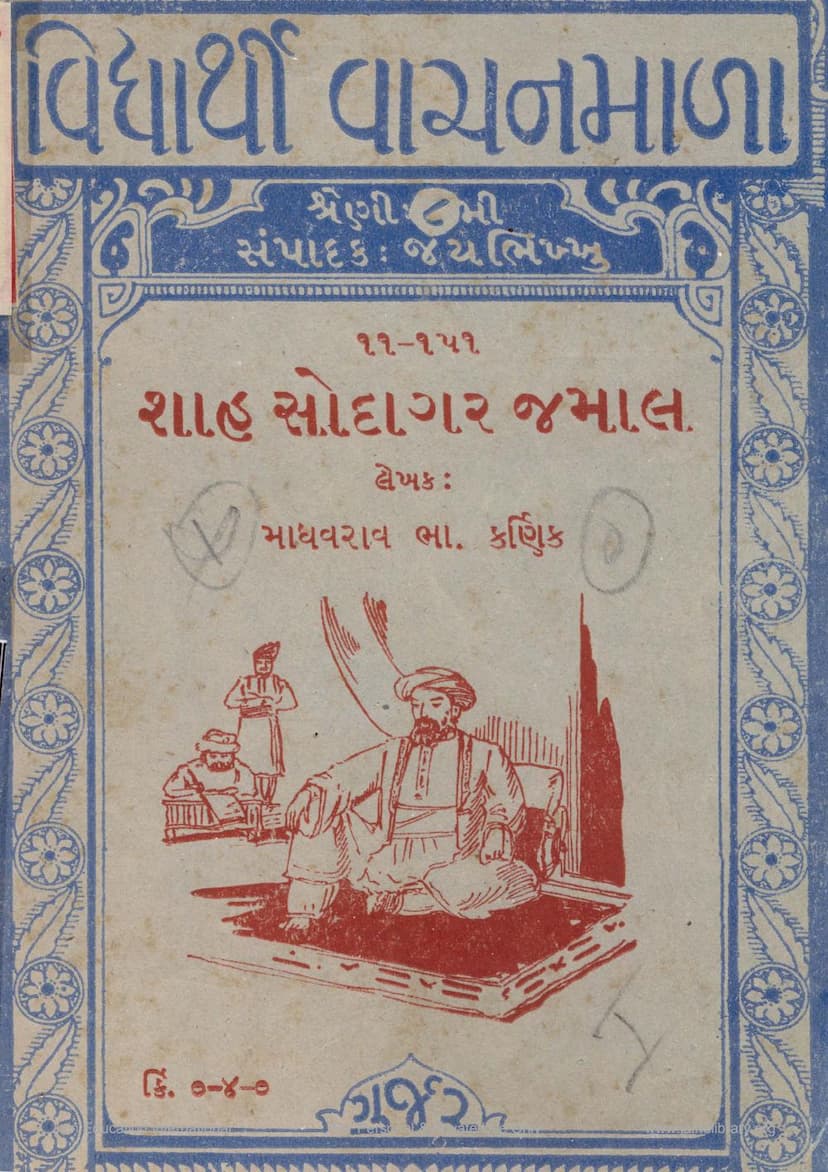Shah Sodagar Jamal
Added to library: September 2, 2025

Summary
The book "Shah Sodagar Jamal" (Merchant Jamal) by Madhavrav B. Karnik, published by Gurjar Granthratna Karyalay, is a biographical account celebrating the life and achievements of Sir Abdul Karim Jamal, a prominent Gujarati businessman who made his mark in Burma (now Myanmar).
The book highlights Jamal's entrepreneurial spirit and his significant contributions to various industries. It begins by describing the inauguration of a grand building belonging to his business, emphasizing his success and the respect he commanded.
Key aspects of Shah Sodagar Jamal's life covered in the book include:
-
Early Life and Origin: Jamal was born in Jamnagar, Saurashtra, in Gujarat. He received his education there before moving to Rajkot and eventually embarking on a journey to Burma.
-
Business Acumen in Textiles: In Burma, Jamal began his business career, initially in the textile trade. He quickly established himself as a renowned merchant in Rangoon, building a reputation for honesty and fair dealing, earning him the title "Shah Sodagar" (Honest Merchant). This contrasted with a prevailing negative perception of some Indian traders at the time.
-
Dominance in the Rice Trade: Jamal revolutionized the rice trade in Burma. Recognizing the potential to benefit both Burmese farmers and Indian consumers, he invested heavily in rice mills and streamlined the export process. His strategic approach led him to control a significant portion of the rice trade, earning him the moniker "King of Rice" or "King of Rice." He was able to dictate prices and outmaneuver competitors due to his extensive network, ownership of mills, and sharp business intellect.
-
Venturing into the Oil Trade: Following his success in rice, Jamal turned his attention to the kerosene (grass oil) trade. Despite facing stiff competition from established foreign companies with substantial capital and political backing, Jamal successfully entered this sector. He established "The Indo-Burma Petroleum Company" and acquired numerous oil wells, becoming a major player in Burma's nascent oil industry.
-
Attempt in the Sugar Industry: Jamal also envisioned developing the sugar industry in Burma. He aimed to utilize the country's sugarcane production to manufacture sugar for India, which at the time imported a significant amount of sugar from abroad. This venture, however, faced challenges due to the high water content in Burmese sugarcane, leading to financial losses and the eventual sale of his machinery.
-
Support for Indian Shipping: A significant portion of the book details Jamal's crucial support for the Scindia Steam Navigation Company. He recognized the vital role of Indian shipping in the nation's economic development and actively fought against foreign competition that aimed to undermine Indian shipping enterprises. When the Scindia company faced intense pressure and boycott from foreign competitors, Jamal single-handedly ensured its survival by consistently booking large quantities of rice on their vessels, even at a substantial financial cost to himself. This act of patriotism and business courage earned him immense respect and a permanent place in the history of Indian shipping.
-
Philanthropy and Education: Beyond his business ventures, Jamal was a renowned philanthropist. He was deeply committed to promoting education and generously donated large sums to educational institutions and individuals. He ran a girls' school in Rangoon at his own expense and supported the teaching of the Persian language, where such facilities were lacking. His dedication to education was so profound that it's stated he spent lakhs of rupees on it, and no scholar seeking aid ever left his doorstep empty-handed.
-
Recognition and Personal Attributes: In recognition of his contributions, particularly his philanthropy and patriotism, the British government conferred upon him the title "Sir." Jamal was known for his straightforward nature, generosity, and deep-rooted Gujarati identity. He was described as tall, robust, with a commanding presence, and always retaining his traditional attire and customs.
-
Legacy: The book concludes by emphasizing that despite his passing, Sir Abdul Karim Jamal's legacy continues to inspire in the world of Gujarati commerce. The author notes the difficulty in compiling his biography, highlighting the humble nature of Jamal himself and the initial reluctance of those who knew him to share information.
In essence, "Shah Sodagar Jamal" portrays Sir Abdul Karim Jamal as a visionary entrepreneur, a patriotic Indian, and a dedicated philanthropist who achieved remarkable success through hard work, honesty, and a commitment to his nation's progress. His life story serves as an inspiration, particularly for his contributions to Indian business and his unwavering support for national enterprises like Indian shipping.